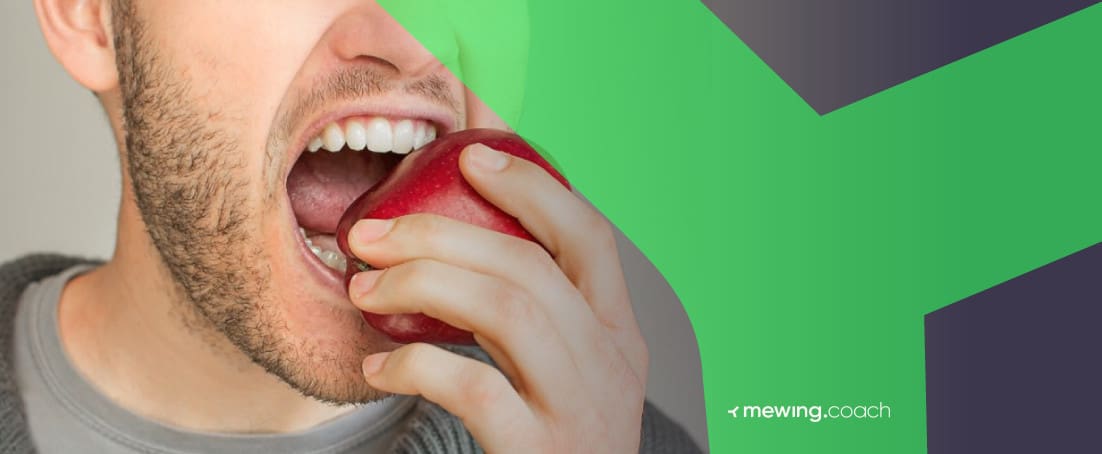Jaw fatigue when chewing can commonly be attributed to the overuse or excessive strain placed on the jaw muscles. This can occur when continuously chewing tough or hard foods without allowing the muscles sufficient time to recuperate. Moreover, factors like temporomandibular joint (TMJ) dysfunction or misalignment of teeth can also contribute to the discomfort experienced during chewing.
Explore further and you’ll learn:
- 📋 The most common symptoms of jaw tiredness.
- 🤔 Why does your jaw get tired?
- 🧬Can some illnesses cause jaw tiredness?
Let’s get into it!

Most Common Reasons for Jaw Muscle Fatigue
When asked, “Are jawlines hereditary?” the simple answer is yes. But with that, so are plenty of disformities that can be the main reason for jaw muscle fatigue.
The weariness of the jaw may not affect only this part of your body but rather all connected muscles and tendons as well. So, some of the most common reasons for jaw fatigue can cause further damage to other body parts and internal systems.
Below are some of the most frequent health conditions people with jaw tiredness experience, as well as some weak jawline fixes.
TMD (Temporomandibular Disorder)
TMD is characterized by a disorder of the jaw muscles, temporomandibular joints, and facial nerves. This health condition may be caused by any issue hindering muscle groups, bones, and/or joints in the face from functioning harmoniously.
TMD is categorized by the following criteria:
- Myofascial pain – This is the most typical TMD phenotype. It can cause discomfort or soreness in the muscles that operate the jaw, neck, and shoulder, as well as in the fascia. Fascia is the connective tissue whose function in the body is to cover and link the muscles one to another.
- Internal joint dislocation – This refers to a fractured or dislocated jaw or disc. The affected part is the cartilage cushion that is located between the jaw bone and the skull. It is often linked to a condyle injury as well. This means that the rounded end of the jaw bone that articulates with the temporal skull bone suffers some kind of injury.
- Degenerative joint condition – This includes jaw joint osteoarthritis or rheumatoid arthritis.
TMD can cause tiredness in the jaw while chewing, feeling TMJ pain, soreness, headaches, popping or clicking of the jaw, and other unpleasant symptoms. One way to help lower the pain is to use mewing. In fact, many people turn to mewing to reduce TMJ pain, as well as strengthen their jaw and facial muscles.
Bruxism
Bruxism, otherwise known as teeth grinding, is a disorder that causes grinding, gnashing, or clenching of your teeth. There are two types:
- Sleep bruxism – If you clench or grind your teeth while sleeping.
- Awake bruxism – If you do it while awake.
People who grind their teeth when they sleep are more prone to snore and experience sleep apnea. Sleep apnea can be extremely harmful to the brain as, during those breathing pauses, the brain doesn’t receive oxygen. And all of this is due to neglecting the importance of correct tongue posture.
Bruxism on a small scale may not require any therapy or treatment. However, severe bruxism may be dangerous as it can cause jaw difficulties, migraines, cracked or chipped teeth, sleep disruption, increased tooth pain and sensitivity, and other issues.
Myasthenia Gravis
Myasthenia gravis is a chronic autoimmune, neuromuscular condition that results in skeletal muscle weakness. It can oftentimes get worse after periods of exertion and get better after periods of rest. These muscles control respiration and the movement of various bodily parts, such as the arms and legs.
The term ‘myasthenia’ has Latin and Greek origins, and closely translates to “significant or grave muscle weakness”. Myasthenia gravis has no known cure, however, with modern treatments, the majority of cases are not as severe as the name suggests.
The good news is there are many available treatments that are used by people experiencing myasthenia to maintain a good quality of life while living with their symptoms. One such option is mewing. In fact, mewing and face muscles are connected, seeing that the whole technique revolves around strengthening them and thus helping you ease the pain from illnesses such as myasthenia gravis.
Pay Your Doctor A Visit For Preventive Measures
Taking good care of your oral health, psyche, and immune system overall can be highly beneficial. Great body shape, restfulness, jawline training methods, proper diet, and peace of mind can help you avoid any of the health conditions linked to jaw muscle fatigue.
However, if you experience any of the above-mentioned symptoms, don’t hesitate and immediately see a doctor.




